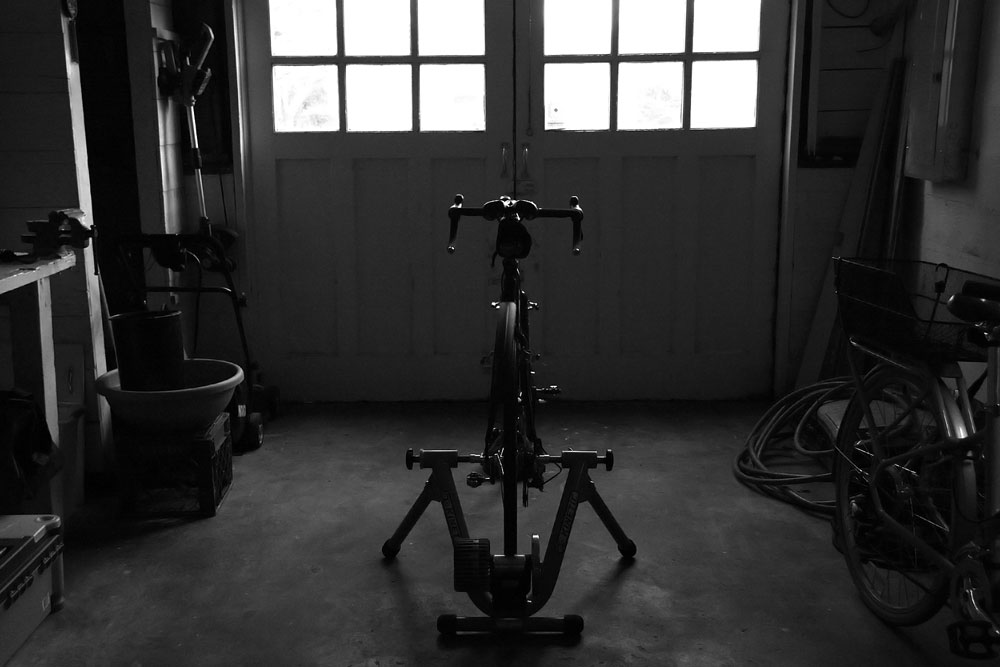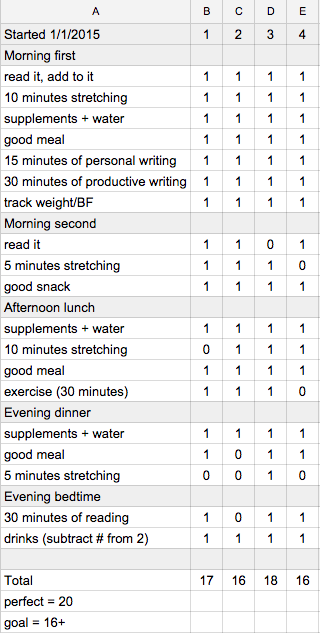
This is a solo journey
On the first of January, I made a few significant life changes to achieve a set of personal goals – healthier consumption, regular exercise, fat loss – I’ve been chasing for years. I think we call this a “resolution” but I’m hesitant to use that colloquialism.
These changes need to stay with me for the rest of my life for their impact to be meaningful.
A resolution is like a goal: it’s a promise to yourself (in this case) to achieve something. An achievement has a beginning, a middle, and an end. In this way, achievements and goals are like little trophies you can arrange on a shelf. You set out to, say, lose 30 pounds, you work towards that goal, and when you finish, you take a photo of the new number and post it on Instagram. Badge acquired, trophy mounted.
Having achieved a number of things I set out to do (and being proud of myself for doing that), I know what this feels like. I also know that any goal that’s worth setting is one that’s worth more than just a merit badge. If you want to run a marathon, it wouldn’t make a lot of sense to look forward to not running forever right after that. With weight loss, nobody wants to lose that weight temporarily and then return to where you were. Unless you’re Patrick Bateman and get paid to do so.

Right before starting this post, I read an article by Scott Adams that perfectly words how I feel about goals, resolutions, and achievements:
To put it bluntly, goals are for losers. That’s literally true most of the time. For example, if your goal is to lose 10 pounds, you will spend every moment until you reach the goal—if you reach it at all—feeling as if you were short of your goal. In other words, goal-oriented people exist in a state of nearly continuous failure that they hope will be temporary.
If you achieve your goal, you celebrate and feel terrific, but only until you realize that you just lost the thing that gave you purpose and direction. Your options are to feel empty and useless, perhaps enjoying the spoils of your success until they bore you, or to set new goals and re-enter the cycle of permanent presuccess failure.
The line about “a state of nearly continuous failure that they hope will be temporary” is exactly what I’d like to avoid, a place I’ve been in many times before. That’s why a resolution or a goal is not going to work for what I want to accomplish. I don’t want to exercise in January, I want to do it forever. I don’t want to lose weight for Spring, I want it gone. I don’t want to eat healthy through the Winter, I want to do it for the rest of my life. I need a system that will help me get there and stay there.
A System
I write software so, for me, thinking in terms of systems is not something I achieve, it’s something I do constantly. This is far from a humble brag; I tend to look for and mentally construct systems everywhere, whether they can help or not. This leaves me in a good place when it comes to code, finances, and to-do lists but often thwarts me with parenting, relationships, and anything else that involves people and forces that lay outside of my control.
In this case, though, a system is exactly what I need. The forces and people and actions are completely within my control. I need to motivate, dupe, and coerce myself into the right behavior for enough time that it becomes habit. If these changes were consciously and immediately enjoyable, they would have been done already. If I likes it, I do it. I need to learn how to like this behavior in order for it to stay.
A Disclaimer
I’m writing this because a component of this system is personal writing, which typically manifests itself as a journal entry, not a blog post. I’m publishing this because I frequently find nuggets of gold while reading other peoples’ stories and I hope this is the case for you as well.
What I’m not going to do, though, is direct you to act in any way. There’s this style of writing that uses “you” as the main pronoun. Someone is reaching out, shaking you by the collar, and telling you what’s going to work. This works fine for marketing but I’m not looking to sell you anything here.
This is my story, what’s been working for me. Everything in here is true, in that the actions and mindset and techniques are what I am using to live a more healthy life. Should you choose to follow the same path, I sincerely wish you complete success. Should you pick and choose from what’s here for your own system, same. Should you think me an idiot and disregard everything, same.
Act 1: Introspection (the “Who”)
I’ve been journaling for about 3 years now. Capturing my mindset at random intervals throughout the year has helped me to reframe, self-examine, and just vent. My writing is typically about my profession – what I’m doing right, what I’m doing wrong, what needs to happen – but, scattered throughout, there are self-deprecating comments about my physical state:
- “…this ‘new’ and ‘healthy’ work landscape is not going to automatically save me from all the shit that has been making me unhealthy and unhappy for the last year … lack of exercise, poor diet, overindulgence…”
- “…but I’m just not taking the time I need for myself. I’m still not exercising enough, I’m still not eating how I want to. I’m still complaining about it as though someone will swoop down and make this easier.”
- “I want a lot of things and I can have all those things but I need my wits about me, good sleep under my belt, and a good outlook on life….I’ve already made and broken so, so many promises. Why will those days be different?”
- “My health has been weighing on me greatly as well. I’m not sure if the main problem is the actual state of my health or the perpetual guilt-trip I’m on. It’s getting very old to commit to something and rescind on it at the first chance. I’m bored with myself in that way.”
These are just a few examples. My point in sharing this is that I have known for a long time that I need to change my habits but the action never happened.
For some reason, around October of last year, the tone changed from shame, confusion, and anger to positivity, optimism, and pride. I started talking about what I liked about myself. I can’t tell you why my mindset changed but I think it, in part, related to the last bullet point above. I became bored with thinking about these changes in the same light.
I started seeing a naturopath in the middle of September. I was having issues with my energy level, regular fatigue, and big mood swings. Forward through 2 sets of labs and a few more appointments and I found myself staring at a treatment plan that summed up a set of changes addressing most of what I’ve been kvetching about:
- Improve sleep
- Exercise
- Healthy eating
This is just a sample of all the recommendations made but it all pointed back to what I’ve been wanting to change. The labs confirmed that I had tangible reasons to make these changes: elevated Epstein-Barr Virus levels, elevated liver enzyme, vitamin deficiencies. It was no longer just a vague malaise, there was an issue. And it was fixable. My favorite kind of issue.
This, finally, became the motivation I needed to take steps towards real, long-term change. It wasn’t just “I want to feel/look/think better,” it was “there are things that will hurt me as time goes on and I can change that.” For whatever reason, this was a much stronger pull.
I spent most of December dwelling on these lab results and thinking/writing about how I would make change happen. I specifically concentrated on why it was going to happen rather than why it would be so hard. The path of feeling sorry for myself was well-worn and got me nowhere; it would be positivity and optimism that would help me make these changes, regardless of how difficult it is for me to think in that way.
A mindset shift like that would be very difficult to just achieve out of the blue so I explored a few ways to make it happen.
Act 2: The Plan
I thought long and hard about what has caused me to fail with previous diets, exercise plans, and behavior changes. It came down to a few key things:
- I often simply forgot that I wanted to make the change, as ludicrous as that sounds. I would commit to it Monday and by Tuesday evening, I had eaten 3000 calories and drank 2 glasses of wine before it occurred to me what I promised the day before. Plan over.
- Faced with a decision between the “good” path and the “bad” one, I would hear (not literally) a voice in my head saying something akin to “eh, fuck it.” It was as simple as that, the devil on my shoulder dismissed a simple opportunity to do the right thing. The angel, inexplicably, remained quiet. Plan over.
- Only a few days in and it would feel like stressful and unnecessary torture. I was hungry, I was stressed out, I was tired, I worked hard that day. Don’t I deserve a reward? Sugar, alcohol, and laziness were my rewards for a job well done. How could I deny myself some kind of pleasure in life? Plan over.
A decade’s worth of therapy sessions and a long, boring, navel-gazing autobiography could probably break those 3 things down into a million separate components but the only thing I wanted to do was change. Why I thought, believed, and acted this way was inconsequential if I could identify why I fail and address it directly. I believed I could do that.
Before January 1st, the date this program would begin, I did three simple things to try and thwart this destructive, default mindset.
Write a Mantra (the “Why”)
I’m only a few days into this journey (I’ve been trying so hard not to use that word) but I will say that this has been the most important component so far.
I wrote out a directed journal entry that addressed why I wanted to make these changes and what I needed to believe for it to become a reality.
This is the Josh I’ve been waiting for.
This is the Josh that will live to 90 rather than 70.
This is the Josh that I can be proud of and feel great about.
This is the Josh that [my daughter] can truly look up to.This won’t be hard, nor arduous, nor feel like torture or restriction or asceticism.
This is a process of gaining, not of losing.
This is a choice I’m making, both willingly and happily.
This is the most important thing that I’ll ever do (again) and I’ll never have to do it again.
This is a gift to myself from myself, not a set of rules being imposed.That this is something I’ve tried before to little/no avail is irrelevant.
That this is something people more often fail at than succeed is inconsequential.
That this comes at the end of the year and smacks of “resolution” is coincidental.
My belief that the unhealthy things I do is my escape and essential to my happiness is false.[…]
This is not about:
– Keeping my word
– Self-deprecation
– Proving myself to anyone
– Competition
– Working harder and longer
– Avoiding regret
I read this twice a day, once in the morning and once in the afternoon. I really read it, let it sink in, let myself believe in these statements.
The language here is positive rather than shaming. It’s my way of actively and regularly reframing these changes from something I have to do to something I want to do. For me, this is a subtle difference that makes me actually feel differently about the process. The second paragraph is all about focusing on the positive aspects of change. I feel good during and after exercise so why think about the worst part, suiting up and getting started? Also, no one is forcing me to do this so why not view it as a positive process rather than a positive outcome?
The list at the end is important. These are all the motivators I’ve tried to use before to differing levels of failure. There is nothing in there that provides me with any kind of power over my will. These are all retroactive, they potentially work after you fail which means you have to fail to feel the impact.
I debated whether or not to share the text above. It’s personal, sounds a bit corny, and probably won’t work, in its current state, for anyone else. But I added it here to show how I was changing my internal language. I’ve read over and over how important it is to “look where you’re going” with everything. I have always dwelled on my shortcomings and that does not work to help me overcome them.
Create an Environment (the “How”)
I’ve learned that the things and people that surround me set the tone for my actions. If I’m surrounded by unhealthy choices and people who make unhealthy choices, it will be very difficult to go against the grain. Anyone who has started a diet or exercise plan have heard that siren’s call from people around them:
It’s fine, it’s just one piece of pie.
Don’t work out tomorrow, you can skip a day.
I used to think that this was the old “misery needs company” row but that just makes everyone around me seem miserable. Instead, it’s people around you who want you to enjoy yourself. They know you love pie and they know you hate running. Why not indulge yourself, just today, and get back on track tomorrow?
Thankfully, the people I spend time with these days are motivated towards positive change and supportive of anyone who wants to do the same. Still, since I’m my worst enemy, I needed to create a “vortex of change” around me that would be hard to resist.
The photo at the top of this post is part of that vortex. I was tempted to join a gym nearby because I like lifting weights but the problem is logistics. I have to find childcare and deal with commute time. With a bike trainer, I can get my exercise time in during naps. It’s out in the garage for both space reasons and because I need a change of scenery now and then. I tried using it in my office and it just ends up being too much time in here (plus I can get distracted by my computer on the way).
The other part is keeping a recurring shopping list of the snacks and drinks I need around to keep my mind off the unhealthy stuff. If I have many healthy options available, it’s easy to skip the others. Also, I’m used to having something interesting to drink at the end of the day. I keep herbal tea (sounds lame, I know, but I’ve really been enjoying it, especially when it’s cold out) and seltzer (SodaStream home-made stuff or La Croix Coconut) around so I have something other than water to keep my mouth busy.
This kind of environment-setting makes it as easy as possible for me to make the right choices. With my mantra rattling around in my head, I find myself not even thinking twice before I’m pedalling or cooking something nutritious.
Keep Score (the “When” and “What”)
This part appeals to my data-gathering, list-making, systematic mind in a big way. It’s also something I read in one of the million “10 Steps to Achieve the Best Year of Your Life” posts.
 The most important tracking that I’m doing is tallying the daily actions that will get me to where I want to be. I made a spreadsheet with days as the column headers and actions as the row headers. The rows are separated into sections based on the time of day. So I have a section for morning, late morning, afternoon, evening, and before bed.
The most important tracking that I’m doing is tallying the daily actions that will get me to where I want to be. I made a spreadsheet with days as the column headers and actions as the row headers. The rows are separated into sections based on the time of day. So I have a section for morning, late morning, afternoon, evening, and before bed.
As I progress through the day, I add a “1” if I did it and a “0” if not. At the bottom is a sum for the day, giving me an overall score. I gave myself a goal of 80%, or 16 out of 20 total actions for the day.
Besides just keeping track of how well I’m doing, this also is a constant reminder of what I need to do. I don’t forget that I need to get up and stretch or track my weight because the spreadsheet is open in a tab all day. After a couple of weeks, I’ll be in more of a habit so the reminder will be less important but the tracking forces me to decide instead of letting me put it off. It’s also a good way to report behavior back to my naturopath so she can make good recommendations.
The other part of this is, of course, weight and body fat tracking. Not much to say here except that tracking my progress helps me figure out if I’m on the right diet, if the exercise is having any impact, and if I’m possibly taking too many cheat meals/days. I’ve been weighing myself for many years and it’s helped me not go overboard. Also, the “down and to the right” slope can be very motivating.
On component I decided not to track this time around is calorie intake. When I first lost weight, I learned how to track everything that went in my mouth. It was drudgery, to be sure, but critical. It’s not until you really see how calories can add up that you start to take away the mystery of why you’re not losing – or gaining – weight. I could easily keep everything pre-dinner to around 1200 – 1400 calories and then, feeling good about this restriction, let myself eat more for dinner and have a few drinks. Before I knew it, I was near 3000 for the day and way over the limit. More recently, I used an app that scanned food and had a built in database of common foods and their calorie content. This made it very easy to track (I wish I had that on the first time around).
Having tracked calories twice for long periods of time, I have a good sense of what’s in everything and can pretty accurately estimate my daily total. I no longer have a penchant for caloric beverages before dinner and don’t have the sweet tooth I once did. I’m rarely surprised by weight loss or gain anymore because I naturally keep track of what I’m consuming.
The key, for me, with all this tracking is to make sure I’m doing enough to keep me motivated and watch progress but not so much that I feel like it’s this annoying new component of my life.
Act 3: In Progress
As of this writing, I’m on my 5th day with this program and it feels distinctly different than other times in my life when I’ve tried something similar. As I mentioned above, the two things that seem to be working together the best are the daily mantra reading and the individual action tracking. They take, maybe, 5 minutes total out of my day and serve as a constant reminder of the individual changes I want to make.
This is, of course, a work in progress, a system that will require maintenance, adjustment over time, and constant self-reflection. All of these changes and actions need to be part of my life for the rest of it for this program to be considered a success. I’m looking to create healthy habits that I rely on and enjoy so if this system does not support that next month, next year, or whenever, then it needs to change. Maybe I begin commuting by bike to a job, maybe I join a gym, maybe I decide to go vegan (haha) … if something changes in my life, then this system will need to change as well.
One thing I want to mention before I end this tomb:
A Caveat
I am fascinated by the concept of willpower, both in myself and in others. I’ve found, in my life, that there have been times where I’m sure that I’ll make a positive change and I do; there are other times where I want to change and my mind just says “yeah, that’s probably not going to happen.” I still can’t figure out what puts me in one mode or another but I’ve felt both and the latter is near impossible to get past. For me, it’s when the shoulder devil takes over and says “screw it, let’s not.” I dutifully obey and continue on my path.
I also think about this compared to other people. Willpower is like pain, there’s no way to compare two people’s experience with it. I can say “quitting smoking was unbelievably hard” and that’s my truth. Someone else might have the same exact internal feelings but reframe better and get past it easier. Another person might also have the same feelings, the same internal dialogue, but they can’t/don’t get past it and remain smoking for life. Is it truly harder for that person to quit or are they less resistant to their negative internal voice? Or are those two the same thing? Put another way, is it quantifiably harder for some people to act on the changes they want to make? Is it biological?
I have no answer here. What I will say is that this time around, these changes feel easier. Maybe that’s because I’m starting at the right time or maybe I’ve created the right system to make it happen. Either way, I’m on the right path and I expect to stay there.
Hopefully this little story was helpful to you in some way or at least entertaining. Whatever you’re going through, I’d love to hear about it in the comments.
Edit 1/10/2015:
I was sent an article on NYT about the data/research/science behind why resolutions fail. I try not to put too much weight behind social science research in the media but much of what it said resonates with me.
- Changing habits is more a product of the environment you create rather than the willpower you exercise.
- It takes anywhere from 3 – 35 weeks to create a habit that sticks, an average of 2 months
- Turn the behavior you want to continue into a habit instead of making the decision over and over (leading to decision fatigue and bad choices)
- Combining large changes together can be helpful; a shock to your system can break old habits you’re trying to change
- Don’t rely on shame and guilt
I’d say these are pretty well represented above and speak to the systems I describe above.
Edit 2/9/2015:
Posted my progress in January and what’s next in February
< Take Action >
Comment via:
Subscribe via:
< Read More >
Tags
Newer

Jan 08, 2015
Building a Community Curation Theme: The Making of Rank It WP
I’ve been working on a new theme over the last few months and, now that it’s ready for use, I wanted to walk through how it was built. This is definitely the most technically-involved theme I’ve ever built and I learned a lot (more) about WordPress in the process.
